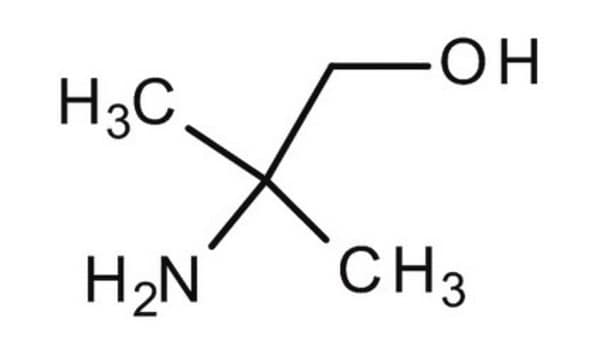08578
2-Amino-2-methyl-1-propanol
BioUltra, ≥99.0% (GC)
Synonym(s):
β-Aminoisobutyl alcohol, AMP
About This Item
Recommended Products
vapor density
3 (vs air)
Quality Level
vapor pressure
<1 mmHg ( 25 °C)
product line
BioUltra
Assay
≥99.0% (GC)
form
solid
impurities
insoluble matter, passes filter test
refractive index
n20/D 1.4455 (lit.)
n20/D 1.448
pH
11.0-12.0 (25 °C, 0.1 M in H2O)
useful pH range
9.0-10.5
pKa (25 °C)
9.7
bp
165 °C (lit.)
mp
24-28 °C (lit.)
solubility
H2O: 0.1 M at 20 °C, clear, colorless
density
0.934 g/mL at 25 °C (lit.)
anion traces
carbonate (CO32-): ≤1000 mg/kg
chloride (Cl-): ≤50 mg/kg
sulfate (SO42-): ≤50 mg/kg
cation traces
Al: ≤5 mg/kg
As: ≤0.1 mg/kg
Ba: ≤5 mg/kg
Bi: ≤5 mg/kg
Ca: ≤10 mg/kg
Cd: ≤5 mg/kg
Co: ≤5 mg/kg
Cr: ≤5 mg/kg
Cu: ≤5 mg/kg
Fe: ≤5 mg/kg
K: ≤50 mg/kg
Li: ≤5 mg/kg
Mg: ≤5 mg/kg
Mn: ≤5 mg/kg
Mo: ≤5 mg/kg
Na: ≤50 mg/kg
Ni: ≤5 mg/kg
Pb: ≤5 mg/kg
Sr: ≤5 mg/kg
Zn: ≤5 mg/kg
SMILES string
CC(C)(N)CO
λ
0.1 M in H2O
UV absorption
λ: 260 nm Amax: 0.01
λ: 280 nm Amax: 0.01
InChI
1S/C4H11NO/c1-4(2,5)3-6/h6H,3,5H2,1-2H3
InChI key
CBTVGIZVANVGBH-UHFFFAOYSA-N
Looking for similar products? Visit Product Comparison Guide
Application
Caution
Other Notes
Signal Word
Danger
Hazard Statements
Precautionary Statements
Hazard Classifications
Aquatic Chronic 3 - Eye Dam. 1 - Skin Irrit. 2
Storage Class Code
11 - Combustible Solids
WGK
WGK 1
Flash Point(F)
179.8 °F - closed cup
Flash Point(C)
82.1 °C - closed cup
Personal Protective Equipment
Choose from one of the most recent versions:
Already Own This Product?
Find documentation for the products that you have recently purchased in the Document Library.
Customers Also Viewed
Our team of scientists has experience in all areas of research including Life Science, Material Science, Chemical Synthesis, Chromatography, Analytical and many others.
Contact Technical Service







